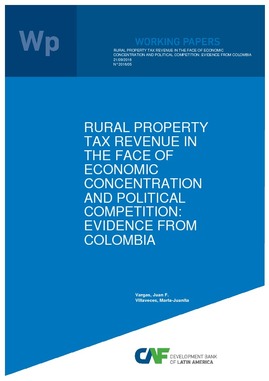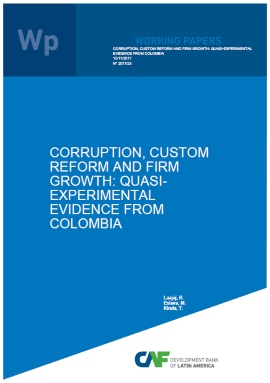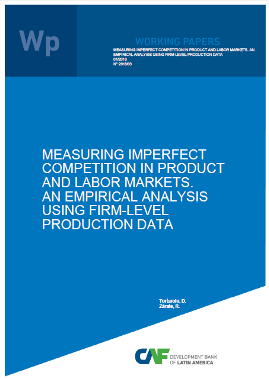Mostrar el registro sencillo del ítem
Rural Property Tax Revenue in the Face of Economic Concentration and Political Competition: Evidence from Colombia
| dc.contributor.author | Vargas, Juan | |
| dc.contributor.author | Villaveces, Marta-Juanita | |
| dc.coverage.spatial | Colombia | en_US |
| dc.date.accessioned | 2016-09-27T14:55:38Z | |
| dc.date.available | 2016-09-27T14:55:38Z | |
| dc.date.issued | 2016-09-21 | |
| dc.identifier.citation | Vargas, J., & Villaveces, M.-J. (2016, September 21). Rural Property Tax Revenue in the Face of Economic Concentration and Political Competition: Evidence from Colombia. CAF–Working paper;N° 2016/05, Caracas: CAF. Retrieved from https://scioteca.caf.com/handle/123456789/945 | en_GB |
| dc.identifier.uri | https://scioteca.caf.com/handle/123456789/945 | |
| dc.description.tableofcontents | We study the relationship between two sources of political power and property tax revenues in contemporary rural Colombia. First, de jure political power is the extent to which local political elites can capture the public administration for their own benefit. Second, de facto political power is the extent to which economically powerful landowners can influence policy. Using a panel of municipalities, we show that places with either high economic or high political concentration raise more taxes, but places with both high political and economic concentration perform worse. | en_US |
| dc.language.iso | en | en_US |
| dc.publisher | CAF | en_US |
| dc.relation.ispartofseries | CAF–Working paper;N° 2016/05 | |
| dc.rights | CC-BY-NC | es_ES |
| dc.rights.uri | http://creativecommons.org/licenses/by-nc/4.0/ | es_ES |
| dc.subject | Desarrollo rural | en_US |
| dc.subject | Impuestos | en_US |
| dc.subject | Investigación socioeconómica | en_US |
| dc.title | Rural Property Tax Revenue in the Face of Economic Concentration and Political Competition: Evidence from Colombia | en_US |
| dc.type | workingPaper | en_US |
| dc.publisher.city | Caracas | en_US |
Ficheros en el ítem
Este ítem aparece en la(s) siguiente(s) colección(ones)
-
6.1 Documentos de trabajo en investigación socioeconómica
En esta colección se encuentran los documentos de trabajo sobre temas económicos y sociales prioritarios para la región.






